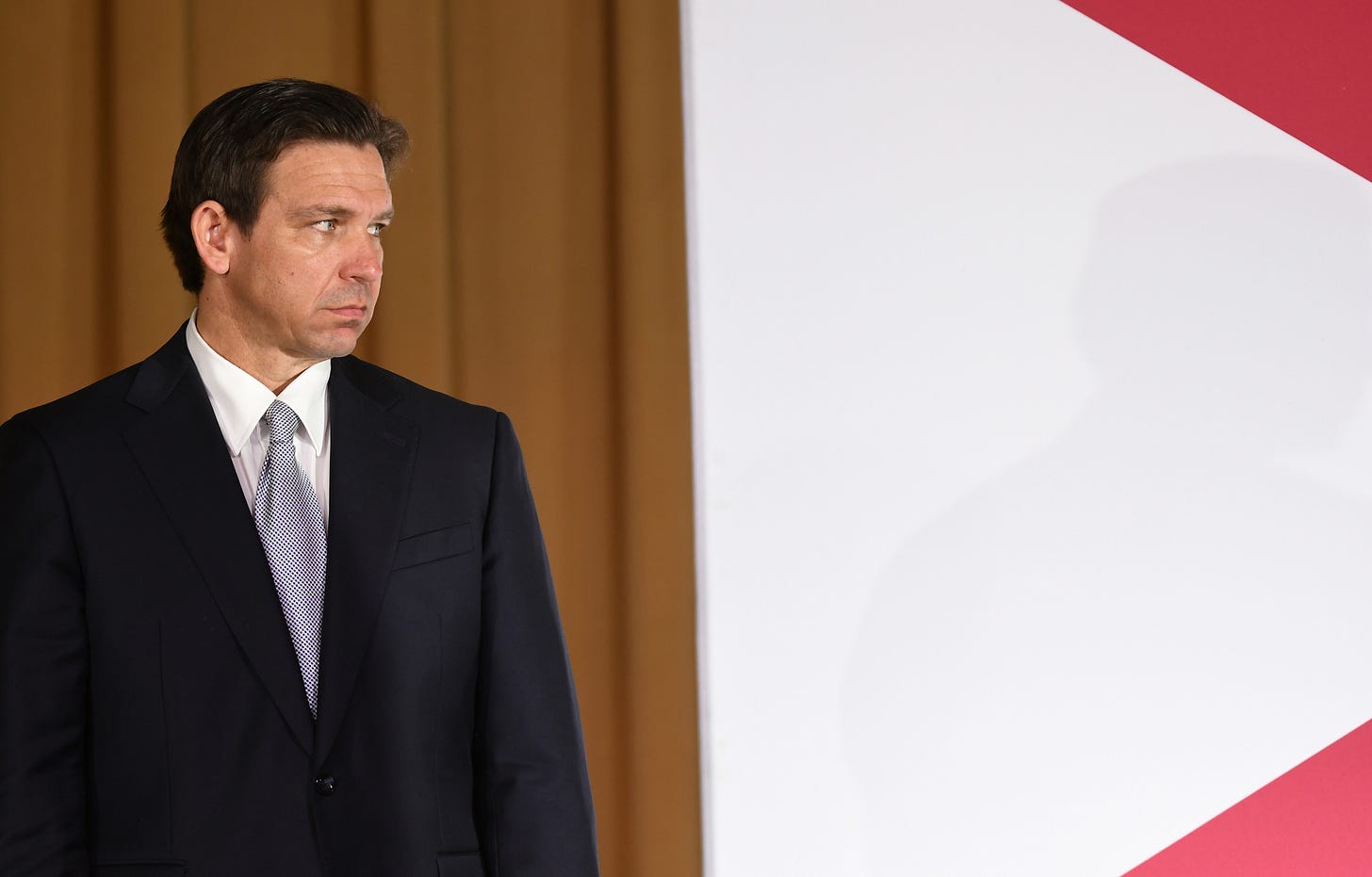Ron DeSantis's charisma problem
Historian Julian Zelizer on the power of personality for presidential candidates.
A note from Aaron: Tomorrow I’m running special Saturday paid subscriber-only edition of the newsletter featuring an interview with climate professor Mark Jacobson about orange skies over American cities and whether they could prompt action on climate change. To get it directly in your inbox, be able to read everything I publish here on Public Notice, and support our work, please become a paid subscriber if you aren’t one already.
Considering most people (and especially MAGA Republicans) aren’t policy wonks, a lot of what makes a presidential campaign successful is how voters feel about the candidate. Are they the type of person you’d like to have a beer with? Sure, voters care about what the candidate is promising, but they also care about who they are. And for Ron DeSantis, that’s a problem.
There’s been a stream of reports, many dropping in recent weeks, about DeSantis not being the most natural retail politician. He’s awkward around voters and donors. He’s eating pudding with his fingers. He malfunctions from time to time. He has a crazy laugh. He wipes snot on people.
It’s gotten to the point where Politico recently ran a piece about autism advocates “dreading a campaign season of insinuations about Ron DeSantis.”
DeSantis just doesn’t come across as the kind of charismatic leader that low-information voters get enthused about. That state of affairs stands in contrast to the GOP frontrunner he’s trying to unseat, Donald Trump, who despite his many faults — including two indictments and counting — is a cultish figure to his supporters and will never be accused of lacking charisma. And Trump is now openly mocking DeSantis’s lack of juice.
“He has no personality,” Trump said of DeSantis during a speech Saturday in North Carolina, prompting laughter from his audience.
To get some expert perspective and historical context about how personality has played a role in presidential campaigns, Public Notice contributor Thor Benson spoke with Princeton political history professor Julian Zelizer.
“The issue of personality has become more pronounced as TV started playing a big role,” Zelizer said. “You just see the person now more than in the newspaper era … Teddy Roosevelt’s personality was a big asset, but it wasn’t quite the same. You didn’t see him quite as much.”
But before we got to DeSantis and some discussion of presidential history, we began with asking Zelizer how Trump’s second indictment and the buffoonish conduct detailed in the charging document could affect perceptions of his personality. A transcript of the conversation, lightly edited for length and clarity, follows.
Public Notice
Personality is being brought up these days mostly in connection with DeSantis, but let’s get a Trump question out of the way. Do you think the revelations in his federal indictment could lessen the appeal of his personality, either among his base voters or the swing voters he would need to beat Biden? Or do people just have their minds made up already?
Julian Zelizer
The severity of the indictment, with the dramatic detail about serious national security documents floating around and clear efforts to hide the boxes, could certainly cause many independents to think twice about throwing their support behind Trump and might cause some Republicans to be unnerved about his electability. Though as we have seen time and time again, his base remains solid in politically perilous moments like this and, just as important, the rest of the party tends to be supportive or remain silent — and complicit — at worst. It’s not clear to me how this will fundamentally change the political dynamics that have been at work, and Trump is only starting to ramp up his attacks on the investigators, which is a core theme of his political career.
I don't think this will change how many people view Trump's character. Those who love him love the outlaw, anti-establishment, in your face, tough guy persona. Those who don't, don't. The only thing the indictment and trial can change is how many supporters think that the persona has become too much of a risk. But the character won't be impacted.
Thor Benson
More broadly speaking, how important do you think personality is when it comes to presidential candidates?
Julian Zelizer
It matters. Ever since TV became the dominant mechanism for ads and debates in the 1960s, personality plays a part in how people evaluate a leader. Trump’s disruptiveness has an appeal even as others think is a huge turnoff, while Al Gore is an example of a situation where for some reason a candidate’s personality didn’t really resonate.
Of course, it’s not the only thing. Things like the economy and local conditions matter, but I do think personality is a big and important part of the mix.
Thor Benson
It seems like Ron DeSantis is going to have problems with this. Are there examples of previous presidential candidates who had similar issues with charisma?
Julian Zelizer
There’s a long list of people. One is Richard Nixon. He didn’t really connect with voters. People didn’t trust him. In the end, it wasn’t enough to stop his success. He was elected and then reelected. He resigned in scandal, but not because of any personality issues.




